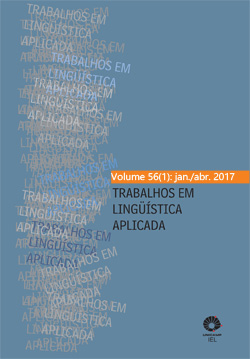Resumo
This papers aims at discussing some principles of a genre-oriented approach to foreign language teaching from the perspective of Functional Linguistics. We also argue in favor of the relevance of using technological tools to enrich writing pedagogy. To do that, we analyze some sample in-class activities that come from two different educational contexts: a Diploma course intended to English teachers in continuing education and a course on academic writing, designed to medical graduate students. Our findings point to the significance of combining a process and a product-oriented approach to writing, including instruction; text revision and rewriting; and scaffolding. Finally, we make the case that a functional view of language should underpin a genre-oriented pedagogy, as it opens room for analyzing language as a social enterprise.Referências
BRAGA, D. B. (2013). Ambientes Digitais. Reflexões teóricas e práticas. São Paulo: Cortez.
BUTT, D.; FAHEY, R.; SPINKS, S.; YALLOP, C. (2003). Using Functional Grammar: An Explorer’s Guide. Sydney: Macquarie University, National Centre for English Language Teaching and Research (2nd edition).
EGGINS, S. (2004). An Introduction to Systemic Functional Linguistics. London: Continuum (2nd edition).
GARRETT, N. (2009). Computer-Assisted Language Learning Trends and Issues Revisited: Integrating Innovation. The Modern Language Journal. v. 93, Issue Supplement s1, pp. 719-740.
HAFNER, C.A.; CANDLIN, C.N. (2007). Corpus Tools as an Affordance to Learning in Professional Legal Education. Journal of English for Academic Purposes, v.6, n. 4, pp. 303-318.
HALLIDAY M. A. K. (2004). An Introduction to Functional Grammar. Revised by M. I. M. MATTHIESSEN. London: Hodder Arnold Publication.
HINKEL, E. (2004). Teaching Academic ESL Writing: Practical Techniques in Vocabulary and Grammar. London: Lawrence Erlbaum Associates.
HINKEL, E. (2011). What research on second language writing tells us and what it doesn’t. In: Hinkel, E. (Ed.), Handbook of Research in Second Language Teaching and Learning, Volume 2, London: Routledge, pp. 523-538.
HUANG, J. C. (2014). Learning to write for publication in English through genre-based pedagogy: A case in Taiwan. System. v. 45, pp. 175-186.
HUNG, S. (2011). Pedagogical applications of Vlogs: An investigation into ESP learners’ perception, British Journal of Educational Technology. v. 42, n.5, pp. 736-746.
HYLAND, K. (2007). Genre pedagogy: Language, literacy and L2 writing instruction. Journal of Second Language Writing. v. 16, pp. 148-164.
HYLAND K. (2008) Writing theories and writing Pedagogies. Indonesian Journal of English Language Teaching. v.4, n. 2.
HYLAND, K.; HYLAND, F. (2006). Feedback on second language students’ writing. Language Teaching. v 39, pp. 83-101.
IGLESIAS, S.; BATISTA, N. (2010). A língua inglesa e a formação de mestres e doutores na área da saúde. Revista Brasileira de Educação Médica. v. 34, n. 1, pp. 74-81, 2010.
MARTIN, J. R. (2002). Meaning beyond the clause: SFL perspectives. Annual Review of Applied Linguistics, v. 22, pp. 52-74.
MUNGRA. P.; WEBBER, P. (2010). Peer review process in medical research publications: Language and content comments. English for Specific Purposes. v. 29, pp. 43-53.
PAIVA, V. L. M. O. (2012). English Language teaching and learning in the Age of Technology. Disponível em: http://www.veramenezes.com/abrapui2012.pdf. Acessso em 01jul. 2016.
PALTRIDGE, B. (2014). Genre and second-language academic writing. Language Teaching. v. 47, pp. 303-318.
RACELIS, J.; MATSUDA, P. (2013). Integrating process and genre into the second language writing classroom: Research into practice. Language Teaching. v. 46, pp. 382-393.
REPPEN, R. (2002). A Genre-Based Approach to Content Writing Instruction. In: Jack C. Richards, J.C. & Renandya, W. A. (ed.), Methodology in Language Teaching: An Anthology of Current Practice. Cambridge: Cambridge University Press, pp. 321-327.
RICHARDS, J. (2014). The Changing Face of Language Learning: Learning Beyond the Classroom. RELC Journal. pp. 1-18.
RUBRICO, J. G.; HASHIM, F. (2014). Facebook-photovoice interface: empowering nonnative pre-service English language teachers. Language Learning & Technology. v. 18, n. 3, pp. 16-34.
SWALES, J. M. (2004). Research genres: Explorations and applications. Cambridge: Cambridge University Press.
SWALES, J.; FEAK, C. (2009). Abstracts and the writing of abstracts. Ann Arbor: The University of Michigan Press.
THOMAS, H. (2009). Learning spaces, learning environments and the dis‘placement’ of learning. British Journal of Educational Technology. pp. 1-10.
THOMPSON, G. (2014). Introducing Functional Grammar. London: Routledge.
THORNE, S. L.; BLACK, R. W.; SYKES, J. M. (2009). Second Language Use, Socialization, and Learning in Internet Interest Communities and Online Gaming. The Modern Language Journal, v. 93, pp. 802-821.
THORNE, S. L.; REINHARDT, J. (2008). Bridging Activities: New Media Literacies, and Advanced Foreign Language Proficiency. CALICO Journal. v. 25, n. 3, pp. 558-572.
Thorne, S. L.; Black, R. W. (2007). Language and literacy development in computer-mediated contexts and communities. Annual Review of Applied Linguistics. v. 27, pp.133-160.
O periódico Trabalhos em Linguística Aplicada utiliza a licença do Creative Commons (CC), preservando assim, a integridade dos artigos em ambiente de acesso aberto, em que:
- A publicação se reserva o direito de efetuar, nos originais, alterações de ordem normativa, ortográfica e gramatical, com vistas a manter o padrão culto da língua, respeitando, porém, o estilo dos autores;
- Os originais não serão devolvidos aos autores;
- Os autores mantêm os direitos totais sobre seus trabalhos publicados na Trabalhos de Linguística Aplicada, ficando sua reimpressão total ou parcial, depósito ou republicação sujeita à indicação de primeira publicação na revista, por meio da licença CC-BY;
- Deve ser consignada a fonte de publicação original;
- As opiniões emitidas pelos autores dos artigos são de sua exclusiva responsabilidade.

